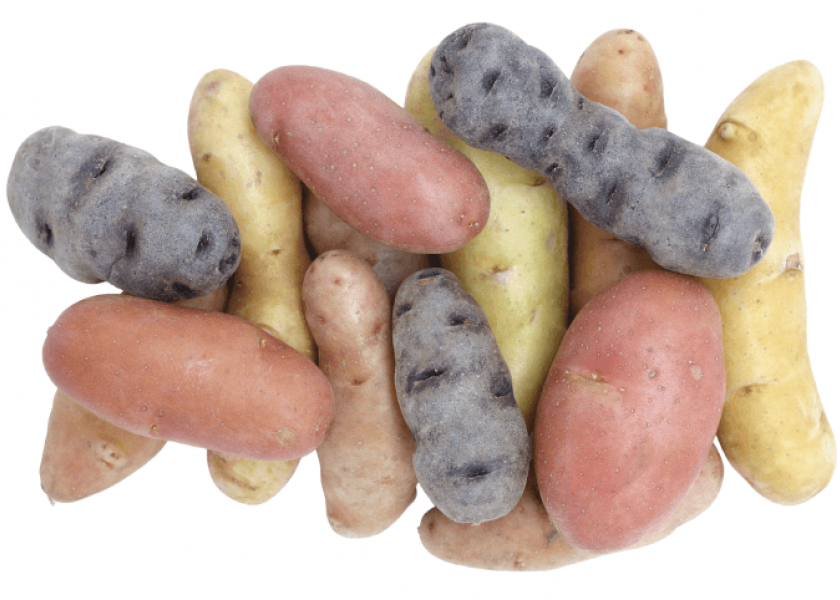San Luis Valley answers feverish potato demand during pandemic

A fingerling points to the destruction wrought by the pandemic of 2020.
The crisis has hammered the foodservice sector — and its suppliers — with notable ferocity, said Sheldon Rockey, partner in Center, Colo.-based Rockey Farms, which grows fingerlings for restaurants.
“We ended up having to dump some fingerlings, basically,” he said.
Rockey said he couldn’t sell half of his fingerling crop.
“Fingerling growers struggled because of the (restaurant) shutdowns in March,” he said. “I usually have a push until May, and that didn’t happen at all. I had some movement, but it was probably 30% of normal.”
The new coronavirus is not an equal-opportunity disaster, though, and some San Luis Valley potato suppliers have kept their product moving into retail outlets, Rockey said.
That should continue into the new potato season, he noted.
“I anticipate it to be strong, retail-wise,” he said. “Obviously, everything is still up in the air in foodservice. I grow a lot of fingerlings destined for foodservice, so I’m a little concerned, I guess.”
Everyone affected
The pandemic has touched everybody in the business in some way, said Kevin Wright, director of account management-West with Bancroft, Wis.-based RPE Inc.
“COVID-19 has been a major impact on all parts of society, and the food and potato business has been affected in so many ways,” he said.
“We do not have a pandemic playbook to work (from), but it has certainly opened a lot of eyes on how we may need to do business differently in the future.”
The pandemic has been “nothing short of seismic” across the potato industry, said Andreas Trettin, marketing director with Houston-based MountainKing Potato, which supplies San Luis Valley potatoes.
“Retail potato sales are up as much as 30% in most markets, driven by a resurgence of in-home cooking and a decline in restaurant dining,” he said. “We’ve seen a dramatic uptick across all of our varieties and package sizes.”
The crisis hit the potato market in waves, starting with a “huge increase in demand” in March and April, said Jim Ehrlich, executive director of the Monte Vista-based Colorado Potato Administrative Committee.
“Since we are primarily a fresh-market supplier, the loss of foodservice business didn’t have a major impact on our primary markets,” he said. “The pandemic’s impact on the potato process growers in the Pacific Northwest created some market supply dynamics that challenged the entire potato supply chain.”
Some businesses quickly adjusted operations to accommodate employees working remotely, but the committee office stayed open, Ehrlich said.
“We have continued our normal operations from our office,” he said.
“We have limited the number of in-person meetings and allowed people to attend meetings remotely. We have tried to support our shippers with up-to-date information from CDC and the Colorado Department of Public Health & Education on recommended and required guidelines on how to best manage their workforce health.”
Safety measures
Meanwhile, warehouses have been able to limit the sickness in their workforces by following recommended safety protocols, Ehrlich said.
“Regionally our local caseload of virus has been manageable for the health sector and continues to decrease over time,” he said.
Person-to-person contact has been limited, Ehrlich noted.
“As far as industry meetings, they are now all virtual in nature, there has been no travel and we have had an increase in communication overall,” he said.
Suppliers have safety plans in place, said Jamey Higham, CEO and president of Monte Vista-based Farm Fresh Direct LLC.
“We live day to day with COVID,” he said.
“We are taking as many precautions as possible, but we are all one day away from having a facility shut down. We are putting the safety of our employees first — it has been a fascinating journey so far. Our markets have been helped overall here in Colorado, but we aren’t a heavy foodservice state for potatoes.”
Retail sales remain strong, and the industry is “seeing a new norm being established, as more people are eating at home,” said Eric Beck, marketing director of Idaho Falls, Idaho-based Wada Farms Marketing Group, which markets potatoes out of the San Luis Valley.
“Organizationally we have been very busy keeping up with demand, balancing the production quotas, and all while we establish new industry practices that will help keep our employees safe,” he said. “I believe the industry mimics our organizational approach.”
The U.S. Department of Agriculture’s Farmers to Families Food Box program has helped, said Art Miller, owner of Phoenix, Ariz.-based Epic Produce Sales, which markets San Luis Valley potatoes.
“With the USDA box program, it has caused some increase in demand that normally wouldn’t be there,” he said.
“In our business, we took a pretty big hit on the foodservice side because of places opening and closing again. There’s a lot still up in the air.”
That may be the worst part of the crisis, Miller said.
“When you just have no idea what’s going to happen, that puts everybody in a little bit of a panic,” he said. P
Uncertainty affects the markets, too, said Les Alderete, general manager of Center, Colo.-based Skyline Potato.
“The markets have been off because of the uncertainty of the virus,” he said. “Retail has been strong, but foodservice has been hit the hardest.”
Related Content:
COVID-19 crisis spurs uptick in bagged potatoes, suppliers say
San Luis Valley potato suppliers anticipate good year in 2020







